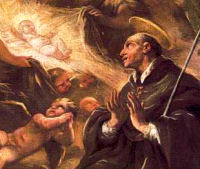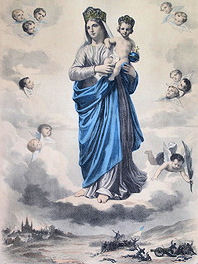Make your gift today!
Help keep Catholics around the world educated and informed.
Already donated? Log in to stop seeing these donation pop-ups.
Christmas: January 8th
Thursday after Epiphany
Other Commemorations: St. Laurence Justinian, Bishop and Confessor (RM); Our Lady of Prompt Succor
» Enjoy our Liturgical Seasons series of e-books!
In the General Roman Calendar, this date is a weekday after Epiphany. No feast of a saint is celebrated.
"Entering the house the Magi saw the Child and Mary His mother. And prostrating, they adored Him. Then opening their treasures, they offered Him gifts: gold, frankincense, and myrrh. What, one wonders, moved them to adore the Child? Outwardly, there was nothing unusual about the Virgin; and the house, too, was far from impressive. In other respects, also, there was nothing to fill them with wonder or impel them to adoration. Nevertheless, they not only adored, but brought out treasures and offered gifts, such gifts as one proffers not to a man but only to God. For frankincense and myrrh are pre-eminently associated with divinity. What, then, inspired their behavior? The same reason that caused them to leave their homes and undertake their hazardous journey, namely, the star and the enlightenment imparted to their hearts by God Himself. And this it was that little by little led them to perfect understanding.
"Had it not been so, they would never have paid such high honors, because all that could be seen there appeared very commonplace. What appeared to their senses was of no importance outwardly, the crib, the hut, a poor mother. Now the reason why all this happened as it did, was that you might be struck by the Magi's eminent wisdom and learn that they came not merely to a man but to God, and what is more, to God as man's Benefactor. Therefore the Wise Men were not offended by outward appearances but worshipped and presented gifts — gifts, I say, that differed greatly from those which the Jews in their grossness were using. They did not immolate a sheep or goat but made a spiritual oblation in harmony with the highest ideals of the Church. For they offered the Infant their wisdom, their obedience, and their love." — St. John Chrysostom
St. Lawrence Justinian
 Lawrence, an illustrious example of humility, the "ornament and glory of bishops" (according to Pope Eugene IV), was the first patriarch of Venice. A very pious youth, he was favored in his nineteenth year with a vision of the Eternal Wisdom in the guise of a maiden encircled with light. She invited him to seek her with happiness, rather than satiate his baser lusts. He obeyed the invitation. Soon thereafter he became a clerk regular of St. George on the island of Alga, later bishop of Venice.
Lawrence, an illustrious example of humility, the "ornament and glory of bishops" (according to Pope Eugene IV), was the first patriarch of Venice. A very pious youth, he was favored in his nineteenth year with a vision of the Eternal Wisdom in the guise of a maiden encircled with light. She invited him to seek her with happiness, rather than satiate his baser lusts. He obeyed the invitation. Soon thereafter he became a clerk regular of St. George on the island of Alga, later bishop of Venice.
Some of St. Lawrence's special charisms were the gift of tears, power over devils, prophecy. One Christmas night the Christ-Child appeared to him. When an attempt was made during his last sickness to put him on a more comfortable bed, he refused this pleasure with the words, "My Savior died not on feathers but on the hard wood of the Cross," and requested to be laid on his usual couch. As he felt his last moments approaching, he lifted his eyes to heaven and said, "I am coming, good Jesus, to You," and slept blessedly in the Lord (January 8, 1455). At the time Venice was at the zenith of its influence and wealth. But God made that proud city understand that her greatness resulted more from the sanctity of her poor patriarch Lawrence than from the diplomacy of her doges and the power of her galleys.
—Excerpted from The Church's Year of Grace, Pius Parsch
Symbols and Representation: Bishop’s mitre; bishop’s crosier
Patronage: Venice, Italy
Highlights and Things to Do:
- Learn more about St. Lawrence Justinian:
- Read Two Great Saints on Prayer
Our Lady of Prompt Succor
 Devotion to Our Lady of Prompt Succor dates back to 1802, when the Ursuline Order in New Orleans pleaded for help in sustaining the Order with new sisters from France. Their prayers were answered with papal permission for sisters to be transferred from France to New Orleans. In thanksgiving for this favor, the Ursulines dedicated a statue in their convent chapel to Our Lady of Prompt Succor in 1810.
Devotion to Our Lady of Prompt Succor dates back to 1802, when the Ursuline Order in New Orleans pleaded for help in sustaining the Order with new sisters from France. Their prayers were answered with papal permission for sisters to be transferred from France to New Orleans. In thanksgiving for this favor, the Ursulines dedicated a statue in their convent chapel to Our Lady of Prompt Succor in 1810.
In 1812, a terrible fire broke out in New Orleans, and the wind was blowing the flames toward the convent. Prayers before the statue of Our Lady were answered with a reversal of the wind direction and the convent was spared.
During the Battle of New Orleans, in 1815, the sisters again invoked the assistance of Our Lady of Prompt Succor. As the sound of guns and cannons thundered around the chapel during Mass, they vowed to have a Mass of Thanksgiving sung every year if the Americans were victorious. At Communion time, a messenger arrived with the news that Gen. Andrew Jackson's overmatched army had successfully driven the British from the city. Once again Our Lady had responded promptly.
In 1928, the Holy See approved the selection of Our Lady of Prompt Succor as the Patroness of the city of New Orleans and the state of Louisiana. The Mass of Thanksgiving is offered each January 8 at the Shrine of Our Lady of Prompt Succor in New Orleans.
Patronage: Camerino, Italy; Castellammare del Golfo, Italy; Kercem, Malta; Louisiana; archdiocese of New Orleans, Louisiana; city of New Orleans, Louisiana
Highlights and Things to Do:
- Visit virtually National Shrine of Our Lady of Prompt Succor.
- Read more about Our Lady of Prompt Succor:






